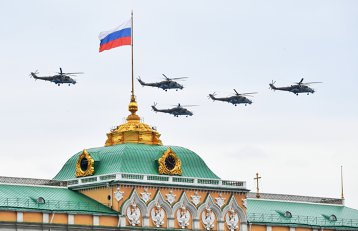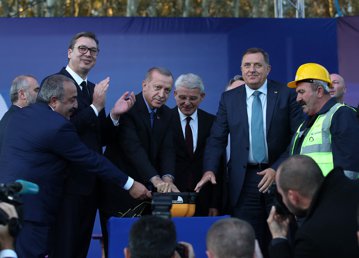
The 2019 Economic Forum from Davos - “a firefighters conference and no one’s allowed to speak about water”?

Even when dealing with a forum which is somehow trying to avoid conflictual speeches and debates, the organizers are admitting that the contemporary world is facing an “unprecedented uncertainty, fragility and controversy”. Although called “4.0 Globalization: shaping the global architecture in the age of the Fourth Industrial Revolution”, this year’s meeting, held in Davos, the famous Swiss resort, has brought back topics like global inequality and climate change. Two weeks after the annual meeting of the World Economic Forum from Davos has ended, we are trying to analyze, in an age of global warming, including a political one, the significance of this event.
In 2018, the American president Donald Trump stated, at the annual meeting of the World Economic Forum, that “It’s a privilege to be here at this forum where leaders in business, science, art, diplomacy and world affairs have gathered for many years to discuss how we can advance prosperity, security and peace”. However, at the beginning of 2019, the republican president announced that he cannot come at this year’s meeting in Davos because of the “government shutdown” in Washington and the dispute with the Congress, controlled by the democrats related to the 2019 budget.
For most of the observers, the presence in Davos of the American president, a politician who is sometimes circumspect against multilateralism, was a paradox. However, any paradox hides, eventually, a good explanation. As the Chinese vice-president, Wang Qishan, declared in 2019, the Forum is “an important platform for China to learn about the world, exchange views, state its position and seek common understanding”. Just a year ago, a true “rhythm breach” was happening in the globalization process, when the People’s Republic of China restated its support for globalization and of the maintenance of free trade, while the United States of America started a rhetoric of tariffs and trade protectionism, denouncing some free trade agreements such as the Transpacific Partnership (TPP).
Maybe the participation of leaders from different social classes to a multidimensional dialogue could be seen just as an exercise of image or an excuse to tourism, even at expensive prices, in a beautiful winter Swiss resort. But such a perspective could fit only tourists and hotel keepers. An event such as Davos must be looked at from a more complex perspective. Taking part in a discussion has also other significance than the actual content of the discussion. It is the idea of being part of an “international society”, wherein opinions, scenarios and innovative ideas can emerge or can be debated. And, as we can see, chase is more important than the catch.
The role of the World Economic Forum is relatively well defined in the architecture of the global economic governance. It is not an institutional pillar of the global economic order, like the International Monetary Fund, the World Bank or the World Trade Organization. Meanwhile, it is different from the Economic Development and Cooperation Organization as it is not reserved to politicians and public policymakers. The World Economic Forum was launched in 1971 under the name “The European Management Forum”, starting from the idea that global businesses elite should meet in order to explore the scenarios related to the future and to be aware of the political and social context the businesses are being operated in.
Actually, its founder and CEO, the Swiss management professor, Klaus Schwab, was the one who has launched the “stakeholder management” concept. Later, the participants and organizers have realized that without the political element, such an exploration of the hypothesis, models and scenarios is difficult. Hereof, starting with 1974, the political factor had its role, sometimes more mediatized than businesses and economic elements. Today, the magnitude and the impact of the World Economic Forum qualified it as important as the institutions governing the international economic systems for more than three quarters of a century.
Together with Wang Qishan, high-level officials from all over the world were present at the annual meeting of the 2019 World Economic Forum, like prime ministers from Germany (Angela Merkel), Italy (Giuseppe Conte), Spain (Pedro Sanchez), Belgium (Charles Michel) and Netherlands (Mark Rutte). Although the Europeans were in majority, in Davos there were also guests coming from across the seas and continents, like the South-African president Cyril Ramaphosa or the prime-ministers of Japan (Abe Shinzo) and New Zeeland (Jacinda Ardern). Less famous, which is maybe unfair, were the leaders from the business like Bill Gates (Microsoft), Dara Khosrowshahi (UBER), James Gorman (Morgan Stanley), David Solomon (Goldman Sachs), Daniel Shulman (Paypal) or Rich Lesser (Boston Consulting Group) and many others (around 3000).
The World Economic Forum is self-defined as “committed to improving the state of the world by engaging business, political, academic, and other leaders of society to shape global, regional, and industry agendas". The fact that Davos is in Switzerland is not by chance. Switzerland’s neutrality seems to be a promising framework because these meetings are proposing a balanced and independent agenda even in controversial political moments. In 1988, Greece and Turkey have negotiated in Davos the avoidance of armed confrontations. Nelson Mandela and Frederick de Clerk have also discussed in 1992 the end of apartheid while Shimon Perez and Yasser Arafat have continued, in 1994, the negotiations for a peace in the Middle East. In 2018, the American and the Russian presidents have participated at the same event.
However, at the same time, Switzerland is one of the richest countries in the world and the idea that in Davos “world’s rich” meet is not accidental. In the previous years, there were also protests against globalization in the Swiss resort. The Transnational Institute, a Dutch ONG has attacked “the Davos class” and the role of WEF socializing institution for the emerging global elite, globalization’s Mafiocracy of bankers, industrialists, oligarchs, technocrats and politicians”.
In fact, the 1000 member members of the WEF Foundation, are paying membership taxes up to 600.000 Swiss francs per year. The logic of resources allocation would tell us that no one would engage in topics which are uncomfortable for these sponsors. However, the last editions of the Forum have revealed a whole different story, transforming it sometimes in a platform against what seem to be a global economic elite with a globalist agenda. In the last years for example, OXFAM leaders, a British NGO spoke against global inequality, accusing companies and governments from rich states for ignorance or even fake speeches.
In 2019, Rutger Bregman, a Dutch historian and journalist has identified the source of the most important issues of the human kind, which is that rich people of this world are not paying their taxes, avoiding this through different legal schemes manipulate the fair reporting of incomes: “taxes, taxes, taxes”, he ended, “it feels like I am at a firefighters conference and no one’s allowed to speak about water”. Paying such taxes, the young Dutch journalist said, would allow countries to reduce the working days in a week to 3 or 4, everyone could have a minimum guaranteed income and we could successfully fight, among others, against the global warming.
What Rutger Bregman is not clarifying is who has burned the house. The main causes of Poverty, starvation and misery in most parts of the world are not caused by the rich ones. Jeff Bezos from Amazon, Bill Gates from Microsoft of the investor, Warren Buffet, the richest three people in the world, did not make businesses neither in the Third World, nor with the governments more or less rich or by enriching themselves thorough tax evasion or avoidance.
Because as much water as it would be used at the global level, fire will reignite if the source is not dealth with. And from this perspective, the World Economic Forum seems to have avoided- and most likely will do it also on the future- to engage in explicitly controversial topics such as good governance, corruption and the responsibility of policymakers. As always, criticizing people and private companies is more convenient than criticizing public policymakers.
And the essential question emerges: in the end, what’s so important in having and listening to speeches, in launching new ideas in the public space (some of which will fade away in the coming years)? Probably the core answer is that such a dialogue is the image of an “international society”, about which the English School of International Relations is talking about, wherein the main actors are willing to listen, to understand each other and to identify possible solutions. And the one who is not part at this process today, tomorrow will be ignored and irrelevant.
Exactly 10 years ago, the Turkish president Recep Tayyip Erdogan, at that time prime-minister of his country, was leaving one of Forum’s panel before its end, arguing that he was not allowed to expose all of his arguments. It was about the hot issue of Middle East and the relations between the Israeli and the Palestinians. Of course, the global debate is not allowing all the participants to stand up and fully expose their speeches. But the lack of dialogue is not good for solving the global issues. In a democratic society, nationally, but also internationally, the debates and negotiations are sometimes difficult and time and energy-consuming. All participants must make compromises. However, the alternative is not that attractive.
This is the reason why, most part of the world will expect the 2020 edition of the World Economic Forum from Davos. Not for solving humankind’s issues, neither for saving what’s left, but to prove that the humankind has the same destiny.


